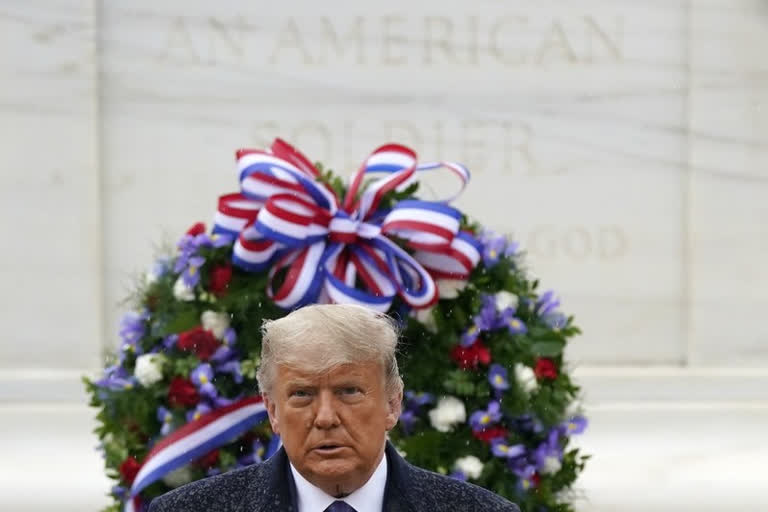Washington: President Donald Trump has publicly disengaged from the battle against the coronavirus at a moment when the disease is tearing across the United States at an alarming pace.
Trump, fresh off his reelection loss to President-elect Joe Biden, remains angry that an announcement about progress in developing a vaccine for the disease came after Election Day. And aides say the president has shown little interest in the growing crisis even as new confirmed cases are skyrocketing and hospital intensive care units in parts of the country are nearing capacity.
The White House coronavirus task force held its first post-election meeting on Monday. Officials discussed the rising case numbers and the promise of a vaccine in development by Pfizer, and they recognized the service of Navy Rear Adm. John Polowczyk, a member of the task force who retired Monday.
But Trump, who does not take part in the task force meetings, remains preoccupied with last week’s election results. He has yet to weigh in on the recent spike in virus cases that has state and local officials scrambling and hospitals concerned about their ability to treat those stricken.
Read:|Boris Johnson refers to Donald Trump as 'previous president'
With more than 100,000 new confirmed U.S. cases reported daily for more than a week, Trump has been more focused on tracking the rollout of a vaccine, which won’t be widely available for months. He has fumed that Pfizer intentionally withheld an announcement about progress on its vaccine trial until after Election Day, according to a White House official who was not authorized to publicly comment and spoke on condition of anonymity. Pfizer said it did not purposely withhold trial results.
Although the president has consistently played down the pandemic, which has killed more than 240,000 Americans and infected more than 10 million people in the U.S., public health experts expressed worry about Trump’s silence on the troubling spike in cases, as well as his refusal to begin coordination on virus issues with Biden’s transition team.
“It’s a big problem,” said Dr Abraar Karan, a global health specialist at Brigham and Women’s Hospital and Harvard Medical School. “The transition is not going to happen until January, and we are in a complete crisis right now. We already know where this is headed. ... It’s not good enough to say we’re going to wait until the next president to address this.”
The president’s silence comes as numerous White House and campaign officials have tested positive for the virus in recent days.
White House chief of staff Mark Meadows tested positive last week after attending an election night party at the White House. Others at the party also have tested positive, including White House political director Brian Jack, former White House aide Healy Baumgardner and Trump campaign advisers David Bossie and Corey Lewandowski. Lewandowski said Thursday that he believes he contracted the virus in Philadelphia while assisting the president’s election challenge there.
Meanwhile, state and local officials around the country are scrambling amid mounting caseloads. While Trump stays silent, they are urging their residents to step up mask-wearing and social distancing, as they brace for what many epidemiologists worry is the beginning of a tumultuous period.
In New York, Gov. Andrew Cuomo has issued an order starting Friday for bars, restaurants and gyms to be closed by 10 p.m., and has set a cap of 10 people for private gatherings. In Illinois, public health officials asked employers to allow their personnel to work from home when possible and urged residents to stay at home as much as possible and skip nonessential travel.
In Iowa, Republican Gov. Kim Reynolds, who resisted coronavirus restrictions, announced earlier this week that masks will now be required at indoor events of more than 25 people, and she banned outside events of 100 or more people unless all attendees wear masks.
Read:|Joe Biden expected to take up a tough stance against China
